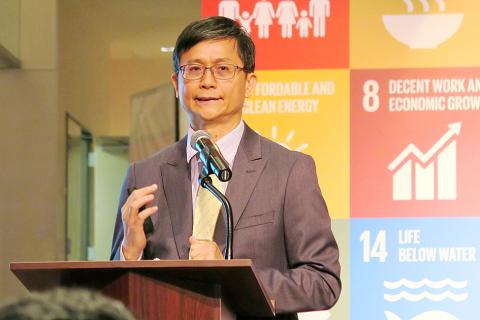Environmental Protection Administration (EPA) Deputy Minister Chan Shun-kuei (詹順貴) resigned yesterday, saying he refused to cave in to pressure from Premier William Lai (賴清德) to sway the agency’s environmental impact assessment (EIA) system.
Chan was a noted environmental attorney prior to being asked to join the Cabinet by then-premier Lin Chuan (林全) after President Tsai Ing-wen’s (蔡英文) Democratic Progressive Party (DPP) administration took office in May 2016 .
Chan first tendered his resignation after Lin stepped down and was replaced by Lai in September last year, citing what he said was Lai’s frequent defiance of democratic principles during his time as Tainan mayor, but was persuaded by Tsai to stay.

Photo: CNA
Amending the Air Pollution Control Act (空氣污染防制法) and the Environmental Impact Assessment Act (環境影響評估法) were the primary reasons he agreed to join the Cabinet, Chan wrote on Facebook yesterday morning.
However, over the past year, officials have not been allowed to thoroughly discuss policies at Executive Yuan meetings, he wrote.
While his goals have not been fully realized, the credibility of the EIA system is being undermined by pressure from Lai, which made him feel ashamed for not being able to accomplish his duties and led to his decision to leave, he wrote.
His announcement came four hours before the EPA’s EIA grand assembly was to open to review CPC Corp, Taiwan’s (台灣中油) plan to construct a third liquefied natural gas (LNG) terminal in Taoyuan.
Chan said he was not trying to influence the assembly with his resignation.
He thanked Tsai, Lin and EPA Minister Lee Ying-yuan (李應元) for supporting his decision, while apologizing for any inconvenience his resignation might cause.
At a news conference about the terminal project yesterday afternoon, Lee praised Chan’s contributions over the past two years and said that he was reluctant to let Chan go.
Later in the day, Executive Yuan spokeswoman Kolas Yotaka confirmed that Chan’s resignation had been approved.
The Executive Yuan understood the stress he was under from environmental groups’ criticism of his role in the EIA approval for the proposed Shenao thermal power plant in New Taipei City, she said in a statement.
Although the CPC’s LNG terminal project is crucial for the government to achieve its “nuclear-free homeland by 2025” policy, the Executive Yuan did not disregard environmental protection principles in its promotion of the project, she added.
The Air Pollution Control Act was amended and promulgated in August. The draft amendments to the EIA act were published by the EPA in September last year, but were not listed as a priority bill in the legislative session that began on Sept. 21.

SECURITY: As China is ‘reshaping’ Hong Kong’s population, Taiwan must raise the eligibility threshold for applications from Hong Kongers, Chiu Chui-cheng said When Hong Kong and Macau citizens apply for residency in Taiwan, it would be under a new category that includes a “national security observation period,” Mainland Affairs Council (MAC) Minister Chiu Chui-cheng (邱垂正) said yesterday. President William Lai (賴清德) on March 13 announced 17 strategies to counter China’s aggression toward Taiwan, including incorporating national security considerations into the review process for residency applications from Hong Kong and Macau citizens. The situation in Hong Kong is constantly changing, Chiu said to media yesterday on the sidelines of the Taipei Technology Run hosted by the Taipei Neihu Technology Park Development Association. With

A US Marine Corps regiment equipped with Naval Strike Missiles (NSM) is set to participate in the upcoming Balikatan 25 exercise in the Luzon Strait, marking the system’s first-ever deployment in the Philippines. US and Philippine officials have separately confirmed that the Navy Marine Expeditionary Ship Interdiction System (NMESIS) — the mobile launch platform for the Naval Strike Missile — would take part in the joint exercise. The missiles are being deployed to “a strategic first island chain chokepoint” in the waters between Taiwan proper and the Philippines, US-based Naval News reported. “The Luzon Strait and Bashi Channel represent a critical access

‘FORM OF PROTEST’: The German Institute Taipei said it was ‘shocked’ to see Nazi symbolism used in connection with political aims as it condemned the incident Sung Chien-liang (宋建樑), who led efforts to recall Democratic Progressive Party (DPP) Legislator Lee Kun-cheng (李坤城), was released on bail of NT$80,000 yesterday amid an outcry over a Nazi armband he wore to questioning the night before. Sung arrived at the New Taipei City District Prosecutors’ Office for questioning in a recall petition forgery case on Tuesday night wearing a red armband bearing a swastika, carrying a copy of Adolf Hitler’s Mein Kampf and giving a Nazi salute. Sung left the building at 1:15am without the armband and apparently covering the book with a coat. This is a serious international scandal and Chinese

COUNTERINTELLIGENCE TRAINING: The ministry said 87.5 percent of the apprehended Chinese agents were reported by service members they tried to lure into becoming spies Taiwanese organized crime, illegal money lenders, temples and civic groups are complicit in Beijing’s infiltration of the armed forces, the Ministry of National Defense (MND) said in a report yesterday. Retired service members who had been turned to Beijing’s cause mainly relied on those channels to infiltrate the Taiwanese military, according to the report to be submitted to lawmakers ahead of tomorrow’s hearing on Chinese espionage in the military. Chinese intelligence typically used blackmail, Internet-based communications, bribery or debts to loan sharks to leverage active service personnel to do its bidding, it said. China’s main goals are to collect intelligence, and develop a